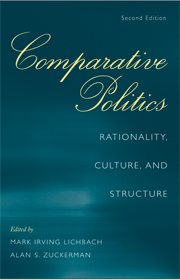Book contents
- Frontmatter
- Contents
- Contributors
- Preface and Acknowledgments
- 1 PARADIGMS AND PRAGMATISM
- 2 THINKING AND WORKING IN THE MIDST OF THINGS
- 3 ADVANCING EXPLANATION IN COMPARATIVE POLITICS
- 4 STRONG THEORY, COMPLEX HISTORY
- 5 RECONSIDERATIONS OF RATIONAL CHOICE IN COMPARATIVE AND HISTORICAL ANALYSIS
- 6 CULTURE IN COMPARATIVE POLITICAL ANALYSIS
- 7 RESEARCHING THE STATE
- 8 AN APPROACH TO COMPARATIVE ANALYSIS OR A SUBFIELD WITHIN A SUBFIELD?
- 9 THE GLOBAL CONTEXT OF COMPARATIVE POLITICS
- 10 COMPARATIVE PERSPECTIVES ON CONTENTIOUS POLITICS
- 11 CITIZENSHIP IN DEMOCRATIC POLITICS
- 12 NESTED CITIZENS
- 13 BACK TO THE FUTURE
- 14 THE COMPARATIVE POLITICAL ECONOMY OF THE WELFARE STATE
- 15 MAKING CAUSAL CLAIMS ABOUT THE EFFECT OF “ETHNICITY”
- References
- Author Index
- Subject Index
- Titles in the series
7 - RESEARCHING THE STATE
Published online by Cambridge University Press: 05 June 2012
- Frontmatter
- Contents
- Contributors
- Preface and Acknowledgments
- 1 PARADIGMS AND PRAGMATISM
- 2 THINKING AND WORKING IN THE MIDST OF THINGS
- 3 ADVANCING EXPLANATION IN COMPARATIVE POLITICS
- 4 STRONG THEORY, COMPLEX HISTORY
- 5 RECONSIDERATIONS OF RATIONAL CHOICE IN COMPARATIVE AND HISTORICAL ANALYSIS
- 6 CULTURE IN COMPARATIVE POLITICAL ANALYSIS
- 7 RESEARCHING THE STATE
- 8 AN APPROACH TO COMPARATIVE ANALYSIS OR A SUBFIELD WITHIN A SUBFIELD?
- 9 THE GLOBAL CONTEXT OF COMPARATIVE POLITICS
- 10 COMPARATIVE PERSPECTIVES ON CONTENTIOUS POLITICS
- 11 CITIZENSHIP IN DEMOCRATIC POLITICS
- 12 NESTED CITIZENS
- 13 BACK TO THE FUTURE
- 14 THE COMPARATIVE POLITICAL ECONOMY OF THE WELFARE STATE
- 15 MAKING CAUSAL CLAIMS ABOUT THE EFFECT OF “ETHNICITY”
- References
- Author Index
- Subject Index
- Titles in the series
Summary
INTRODUCTION
States are wonderful subjects for comparative political analysis and, at the very same time, pose all sorts of thorny problems for any researcher studying comparative politics. They are good, meaty topics because a clear template exists for what a state is or, at least, what it should be, making diverse states eminently comparable. One might think of this template as the gold standard of states. Big or little, rich or poor, strong or weak, old or new, all states should conceivably measure up against this template, even as they deviate from it somewhat in this way or that. Later, I will discuss more fully what goes into this template, but one can get a rough idea by looking at two elements. Max Weber captured the essence of one of these succinctly: “The modern state,” he wrote, “is a compulsory association which organizes domination” (Gerth and Mills 1958: 82). Anthony Marx put his finger on a central second aspect, saying that the population not only serves the state but is served by it, and, in serving its citizens, the state generates allegiance by the population to it (Marx 2003). The state is both feared and loved.
But that gold standard, or template, has had difficulty being standard enough for the nearly 200 states that exist today. In particular, the rush of state creation after the two world wars, coming in the wake of collapsing empires, produced states for which scholars have been at pains to apply the standard template.
- Type
- Chapter
- Information
- Comparative PoliticsRationality, Culture, and Structure, pp. 162 - 192Publisher: Cambridge University PressPrint publication year: 2009
- 26
- Cited by

